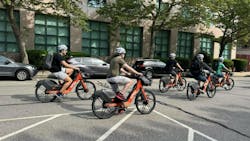City of Raleigh expands micromobility options with dockless bikeshare pilot
A dockless bikeshare pilot program is coming to the city of Raleigh, N.C., this summer, aiming to increase flexibility, improve transportation access and better meet the needs of residents. The city will run the pilot through April 2026 and is part of a broader effort to modernize the city’s shared micromobility system.
The pilot will launch with 215 electric-assist bikes from the city’s existing micromobility vendors, Spin and Lime. The city notes this comes at no operating cost. These newer, more advanced bikes can be parked in designated micromobility corrals—similar to those already in use for scooters—and will be available citywide, including in areas not currently served by the docked bikeshare system.
“This is an opportunity to build on the success of the micromobility program, expand access and flexibility to the bikeshare system and measure if this new model has an impact on bikeshare usage in the city,” said Kenneth Ritchie, manager of the city of Raleigh's Office of Mobility Strategy and Infrastructure.
The city notes the new direction for bikeshare offers users a more flexible, updated bikeshare program, based on best practices and public feedback on the current system. The city says it plans to collect data and community feedback to shape long-term decisions for the micromobility program.
The existing bikeshare equipment will be phased out beginning in mid-August, with a request for proposals for new long-term micromobility services anticipated in early 2026. That process will be open to current and new vendors.
Looking ahead
The city says piloting the new bikeshare system allows Raleigh to test a more adaptable and cost-effective model without compromising rider experience or safety, adding that public feedback will play a key role in evaluating the pilot’s performance. Over the next year, the city notes it will monitor ridership data, conduct surveys and assess how well the new model supports community needs, including affordability and access.
Shared micromobility in Raleigh
Since launch, riders have logged more than 1.9 million miles across scooters and bikes. It’s estimated that these trips have replaced over 550,000 car miles, helping reduce traffic and emissions.
